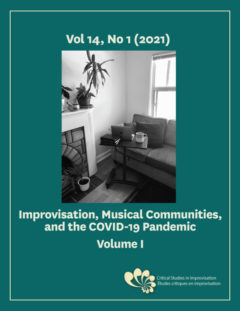 Special Journal Issue on “Improvisation, Musical Communities, and the COVID-19 Pandemic”
Special Journal Issue on “Improvisation, Musical Communities, and the COVID-19 Pandemic”
Critical Studies in Improvisation / Études critiques en improvisation—the peer-reviewed, open-access journal of the International Institute for Critical Studies in Improvisation (IICSI) at the University of Guelph—has released a special issue providing key insights into the pandemic’s effects on artists, arts organizations, and their communities. Published on the one-year anniversary of the global pandemic shutdown, “Volume I: Improvisation, Musical Communities, and the COVID-19 Pandemic,” features more than thirty scholarly articles, essays, reflections, testimonies, interviews, and creative offerings detailing both the significant challenges posed by COVID-19 and the creative solutions taken to overcome these challenges.
“The voices gathered here,” issue editors Daniel Fischlin (University of Guelph), Laura Risk (University of Toronto Scarborough), and Jesse Stewart (Carleton University) write, “evoke scarcity and abundance, precarity and resilience, creative wells overflowing and running dry, power and helplessness, adaptation and exhaustion.” Throughout the issue, musicians, performers, scholars, arts presenters, and other cultural workers provide a first-hand glimpse into the resilience of members of one of the fields most devastatingly impacted by the pandemic.
These pieces consider COVID-19’s ability to collapse space and time, as epitomized by one contributor’s experience of working, teaching, playing, and socializing from her living room—suddenly, her whole world was a laptop and a couch. Musicians articulate the manifold inequities within the music industry—deep-seated racism, rampant sexism, and increasingly exploitative financial structures—and take this once-in-a-lifetime moment of pause to reconsider how the industry can be rebuilt in a post-pandemic world. Technology is central to this issue; creators from around the world address how pivoting to videoconferences and livestream performances have been frustratingly limiting—but have also collapsed borders, challenged norms, and opened up novel possibilities for artistic collaborations and events.
The decision to dedicate an ambitious, two-volume edition of the journal to the COVID-19 pandemic arose from editor Laura Risk. In her article “Come together, right now, over a livestream: The power of music during a pandemic,” published in The Globe and Mail in March 2020, Risk stated that “Community music will survive the pandemic.” As the testimonials in this journal issue attest, that statement has proven to be provisionally true.
“Volume I: Improvisation, Musical Communities, and the COVID-19 Pandemic” can be read now through the Critical Studies in Improvisation / Études critiques en improvisation website, and Volume II, a special double issue, will be published in the Spring. More information about Critical Studies in Improvisation / Études critiques en improvisation, which has published ground-breaking research on improvisation across academic disciplines since 2004, can also be found on the journal website.







